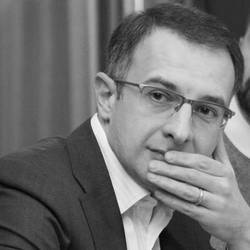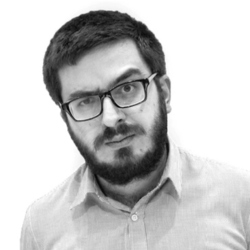My Way Home
16.09.2018
10 min read
Thoughts
116 Days In: Repatriates’ Views on the New Armenia
-webp(85)-o(jpg).webp?token=5faafeb7407ba049b9f32fd05f5b00e6)
On Friday, August 17, Prime Minister Nikol Pashinyan had called for a meeting in Yerevan’s republic square where he would address certain issues and give a full account of the last 100 days in office. Over 100,000 civilians showed up. The government’s young team has been actively cleaning house, greatly appealing to the general population, but also raising questions among a select few. The “Velvet Revolution,” based on the Czechoslovakian Gentle Revolution of last two months of 1989, was bloodless and focused on the the concept of a transcending love for all. It preached tolerance and brotherhood, as well as solidarity with the police that had, to date, been seen as the enemy of the people.
The current government is a temporary one. It is also a very young one, with multiple ministers, deputy ministers, and high-ranking figures between 27 and 35 years of age. In order to solidify its rule, snap elections are in order, where Civil Contract must obtain majority vote. This is expected to take place during the coming spring months. In the meantime, everyone has an opinion, and while some are vilified for raising questions or criticising certain steps taken, everybody is entitled to their opinion. Here are some insights from the past 116 days from repatriates who have moved to Armenia over the past decade from various diaspora communities.
1

Raffi Elliott - Founder, GetTreated.co

Raffi Elliott - Founder, GetTreated.co
(Repatriated from Canada to Armenia in 2011)
On April 13, I joined a small group of demonstrators who had gathered under the shadow of the Opera house to greet Nikol Pashinyan upon his return from his 2-week-long walk across the country. As the weeks passed, and the messages from the stage to swelling crowds took on an ever-more populist tone, I grew concerned that the people, and their newfound leader, might not be ready to take on the mantle of governance.
In the hundred days since Mr Pashinyan took over the Prime Minister’s office, I’m relieved to see that my concerns were mostly unwarranted. Pashinyan remained humble, collected, focused and on message throughout the events of the Velvet Revolution, and seamlessly transitioned from firebrand oppositionist to statesman. Despite the high hopes - nearing personality cult levels- graphed on to him, he has so far refrained from promising the undeliverable.
For the most part, the new government has steered the course between sticking to their original mission and pragmatic decision-making, to the country’s benefit. The Prime Minister is delivering on his promise to rebuild Armenia on a new foundation of the rule of law, individual freedom, and national self-interest. At the same time, he has made significant strategic decisions which helped strengthen his position in government. In the weeks following the Revolution, he has assured his Russian counterparts that Armenia would not deviate from its mutual commitments, fostered alliances of convenience with former political rivals and offered amnesty for those who benefited from the previous regime who were willing to cooperate.
The success that the new government has accrued so far lies not only in the changes they made, but also the elements that they chose to keep. It's all too tempting for new rulers to want to start from scratch. The Velvet Government has been careful to take lessons from which the previous government learned over many hardships, selectively retained some of the better policies, and kept the technocrats who had managed to keep Armenia running for all these years despite the circus at the top.
The ongoing anti-corruption campaign has delivered - mostly visible - results, with dozens of former top-level officials being charged, and tens of millions returned to state coffers. However, very little has been done in the form of real judicial reform to ensure that these processes are legitimate, and long-lasting, rather than the usual act of a new government politically persecuting its predecessors.
The second concern is that the anti-corruption campaign might overshadow more critical structural reform initiatives which Armenia desperately needs. The previous regime left Armenia with a legacy of astronomical debt, and little foreign investment; two things which, added to the uncertainty produced by post-revolutionary turmoil, might scuttle the new Armenia before it begins. Pashinyan has announced on numerous occasions that many have pledged to return and invest in Armenia. Pledges, however, are not the same thing as actual capital flows. The new government should focus on creating the appropriate investment climate in this country. This feat can be achieved through the establishment of an independent and impartial judiciary, as well as investments in Armenia’s high-value sectors: education in the STEMs, infrastructure, and finance.
Many of these more impactful reforms can only take place with a YELQ majority in the National Assembly, which only a new round of elections can achieve. Elections, in turn, can only take place with a rewritten constitution and electoral code. All of which takes time. Pashinyan, I'm certain, is aware that he faces a ticking clock: the longer he stalls, the more vulnerable the 'New Armenia' becomes to those who wish to see it fail.
The Velvet Revolution managed to unite Armenians of all persuasions, from the 3rd-wave feminists to the Ultra-nationalists and everyone in between. Though all agree that the status quo needed to go, views on the future of Armenia vastly differ. At the moment, Pashinyan benefits from widespread enthusiasm and high approval ratings. When the “Դուխով” memorabilia sales begin to drop, and the discussion on the future of Armenia begins in earnest, some will inevitably be disillusioned. That is when the real test will take place. I remain optimistic."
On April 13, I joined a small group of demonstrators who had gathered under the shadow of the Opera house to greet Nikol Pashinyan upon his return from his 2-week-long walk across the country. As the weeks passed, and the messages from the stage to swelling crowds took on an ever-more populist tone, I grew concerned that the people, and their newfound leader, might not be ready to take on the mantle of governance.
In the hundred days since Mr Pashinyan took over the Prime Minister’s office, I’m relieved to see that my concerns were mostly unwarranted. Pashinyan remained humble, collected, focused and on message throughout the events of the Velvet Revolution, and seamlessly transitioned from firebrand oppositionist to statesman. Despite the high hopes - nearing personality cult levels- graphed on to him, he has so far refrained from promising the undeliverable.
For the most part, the new government has steered the course between sticking to their original mission and pragmatic decision-making, to the country’s benefit. The Prime Minister is delivering on his promise to rebuild Armenia on a new foundation of the rule of law, individual freedom, and national self-interest. At the same time, he has made significant strategic decisions which helped strengthen his position in government. In the weeks following the Revolution, he has assured his Russian counterparts that Armenia would not deviate from its mutual commitments, fostered alliances of convenience with former political rivals and offered amnesty for those who benefited from the previous regime who were willing to cooperate.
The success that the new government has accrued so far lies not only in the changes they made, but also the elements that they chose to keep. It's all too tempting for new rulers to want to start from scratch. The Velvet Government has been careful to take lessons from which the previous government learned over many hardships, selectively retained some of the better policies, and kept the technocrats who had managed to keep Armenia running for all these years despite the circus at the top.
The ongoing anti-corruption campaign has delivered - mostly visible - results, with dozens of former top-level officials being charged, and tens of millions returned to state coffers. However, very little has been done in the form of real judicial reform to ensure that these processes are legitimate, and long-lasting, rather than the usual act of a new government politically persecuting its predecessors.
The second concern is that the anti-corruption campaign might overshadow more critical structural reform initiatives which Armenia desperately needs. The previous regime left Armenia with a legacy of astronomical debt, and little foreign investment; two things which, added to the uncertainty produced by post-revolutionary turmoil, might scuttle the new Armenia before it begins. Pashinyan has announced on numerous occasions that many have pledged to return and invest in Armenia. Pledges, however, are not the same thing as actual capital flows. The new government should focus on creating the appropriate investment climate in this country. This feat can be achieved through the establishment of an independent and impartial judiciary, as well as investments in Armenia’s high-value sectors: education in the STEMs, infrastructure, and finance.
Many of these more impactful reforms can only take place with a YELQ majority in the National Assembly, which only a new round of elections can achieve. Elections, in turn, can only take place with a rewritten constitution and electoral code. All of which takes time. Pashinyan, I'm certain, is aware that he faces a ticking clock: the longer he stalls, the more vulnerable the 'New Armenia' becomes to those who wish to see it fail.
The Velvet Revolution managed to unite Armenians of all persuasions, from the 3rd-wave feminists to the Ultra-nationalists and everyone in between. Though all agree that the status quo needed to go, views on the future of Armenia vastly differ. At the moment, Pashinyan benefits from widespread enthusiasm and high approval ratings. When the “Դուխով” memorabilia sales begin to drop, and the discussion on the future of Armenia begins in earnest, some will inevitably be disillusioned. That is when the real test will take place. I remain optimistic."

Aramazt Kalayjian - Communications Expert and Designer
(Repatriated from the US in 2012)
Almost immediately after the “Velvet” revolution, I started hearing the familiar rumblings of Armenian doubt and suspicion. Many have expressed a hope that things will get better, yet seeping through this is the familiar disbelief that any governmental transparency is reflective of theater or show. I find people are waiting to see whether their quality of life would change. Many are waiting for added dram benefits to their monthly income, or reduced tax rates, or socialized benefits for soldiers and the elderly.
Over the past few months, millions of dollars were reaped in unpaid taxes. There have been arrests of corrupt individuals who have served in government. Added-value investments and relationships being cultivated with many new nations, and yet, there still seems to be this unshaken and unwavering lack of faith in the future of Armenia, regardless of party lines.
This waiting for change, where does it come from? What is it that prevents us from seeing strides that have been taken to such a degree that has increased interest, trust and potential investment in Armenia. I understand that there’s an air of euphoria that is now subsiding four months after the revolution, yet the downcast view upon the future horizon of the nation need not descend into the darkness.
New strengths that have been added to the country by the change in government and the decision to appoint merit-based leaders in ministerial and deputy positions has begun an era of cultivated trust in a previously perceived corrupt governmental regime. A new form of transparency and direct connection to the government for diaspora Armenians and locals has brought upon a new found sense of connection to the decision-making process for the nation. Economic incentives for the development of new businesses and the accountability for already established businesses has transformed a “mafia” stained impression into one of regulation and responsibility.
If we are to have a nation that can transform from a survival-based narrative to a thriving and abundant reality, we must accept the challenging realities with grace, while remaining steadfast in honing our attention on the strides and advances made toward developing a robust economy, decentralizing the concept of civil society, and educating ourselves and the new generation about these achievements.
For as long as I’ve been in Armenia, the voices of dissent, critics, doubters, and haters have had their share of the stage on par with intellectuals and scholars. Anyone who expresses a doubt or concern, pointing out flaws and finding faults is given credit of being a worthy intellectual. Yet, what we need now are the builders, dreamers, scientists, creatives, and community organizers to work together with their own visions and their own ideals of what a successful, resourceful, and abundant Armenia looks like; to them, their families, and their communities.
Should we all seek and find fault in every move our new government makes, we risk entering back into familiar habits, where we cling and grasp for survival, instead of the possibility to soar toward the plentiful future.
Almost immediately after the “Velvet” revolution, I started hearing the familiar rumblings of Armenian doubt and suspicion. Many have expressed a hope that things will get better, yet seeping through this is the familiar disbelief that any governmental transparency is reflective of theater or show. I find people are waiting to see whether their quality of life would change. Many are waiting for added dram benefits to their monthly income, or reduced tax rates, or socialized benefits for soldiers and the elderly.
Over the past few months, millions of dollars were reaped in unpaid taxes. There have been arrests of corrupt individuals who have served in government. Added-value investments and relationships being cultivated with many new nations, and yet, there still seems to be this unshaken and unwavering lack of faith in the future of Armenia, regardless of party lines.
This waiting for change, where does it come from? What is it that prevents us from seeing strides that have been taken to such a degree that has increased interest, trust and potential investment in Armenia. I understand that there’s an air of euphoria that is now subsiding four months after the revolution, yet the downcast view upon the future horizon of the nation need not descend into the darkness.
New strengths that have been added to the country by the change in government and the decision to appoint merit-based leaders in ministerial and deputy positions has begun an era of cultivated trust in a previously perceived corrupt governmental regime. A new form of transparency and direct connection to the government for diaspora Armenians and locals has brought upon a new found sense of connection to the decision-making process for the nation. Economic incentives for the development of new businesses and the accountability for already established businesses has transformed a “mafia” stained impression into one of regulation and responsibility.
If we are to have a nation that can transform from a survival-based narrative to a thriving and abundant reality, we must accept the challenging realities with grace, while remaining steadfast in honing our attention on the strides and advances made toward developing a robust economy, decentralizing the concept of civil society, and educating ourselves and the new generation about these achievements.
For as long as I’ve been in Armenia, the voices of dissent, critics, doubters, and haters have had their share of the stage on par with intellectuals and scholars. Anyone who expresses a doubt or concern, pointing out flaws and finding faults is given credit of being a worthy intellectual. Yet, what we need now are the builders, dreamers, scientists, creatives, and community organizers to work together with their own visions and their own ideals of what a successful, resourceful, and abundant Armenia looks like; to them, their families, and their communities.
Should we all seek and find fault in every move our new government makes, we risk entering back into familiar habits, where we cling and grasp for survival, instead of the possibility to soar toward the plentiful future.

Betty Arslanian - Journalist and Marketing Specialist
(Repatriated from Argentina in 2015)
Prime Minister Pashinyan carried out the presentation of the report of his 100 days of government in a special format, in a place many Armenians are sure is his real office: the streets. There, he presented both what has happened and what will come to be.
I understand that it is hard not to get too passionate mentally and emotionally during and after the Velvet Revolution, even if you tried not to expect too much. I do not deny that it was wonderful to see "the awakening" the people, who were victims of an abrupt decrease in confidence for the state and its institutions, and were deprived of the right to have good government. Also, it was awesome to see a new sense of responsibility for the development of the nation and commitment to its future; of course, to also be a part of that. It is all fantastic, but it is also dangerous should the people be overly disappointed with the results.
The "new Armenia" is taking its first steps with reactionary actions such as the crusades against the "bad guys," where the police seem to have recovered their memories and remembered who the real criminals are, while the judges recovered their legal knowledge and began to deliver justice everywhere.
This new Armenia has yet to organize itself and strengthen its structures in order not to damage or disappoint the people of the nation and not to repeat the mistakes of a past, from pages that have long been closed. Theoretically, we have already turned the page of absolutism. From now on, the people need tangible results to demonstrate that this is the "hamerashkh Hayasdan" that Pashinyan promised. It is important that people never again close their eyes or their mind around this. The fever of passion of the most unruly days of the velvet revolution were more than 100 days ago, today we must focus on continuing with the construction of the nation with critical thinking, ideals and hard work.
Prime Minister Pashinyan carried out the presentation of the report of his 100 days of government in a special format, in a place many Armenians are sure is his real office: the streets. There, he presented both what has happened and what will come to be.
I understand that it is hard not to get too passionate mentally and emotionally during and after the Velvet Revolution, even if you tried not to expect too much. I do not deny that it was wonderful to see "the awakening" the people, who were victims of an abrupt decrease in confidence for the state and its institutions, and were deprived of the right to have good government. Also, it was awesome to see a new sense of responsibility for the development of the nation and commitment to its future; of course, to also be a part of that. It is all fantastic, but it is also dangerous should the people be overly disappointed with the results.
The "new Armenia" is taking its first steps with reactionary actions such as the crusades against the "bad guys," where the police seem to have recovered their memories and remembered who the real criminals are, while the judges recovered their legal knowledge and began to deliver justice everywhere.
This new Armenia has yet to organize itself and strengthen its structures in order not to damage or disappoint the people of the nation and not to repeat the mistakes of a past, from pages that have long been closed. Theoretically, we have already turned the page of absolutism. From now on, the people need tangible results to demonstrate that this is the "hamerashkh Hayasdan" that Pashinyan promised. It is important that people never again close their eyes or their mind around this. The fever of passion of the most unruly days of the velvet revolution were more than 100 days ago, today we must focus on continuing with the construction of the nation with critical thinking, ideals and hard work.

Annie Akkam-Student at YSLU
(Repatriated from UAE to Armenia in 2008)
If I say I have noticed great changes, I'd be lying. But if I say nothing has changed at all, that would also be a lie. Forming a new government isn't easy. You can't wake up to a see a new Armenia formed overnight. It takes a long time for the changes to have an effect on the country. We should criticize every steps taken, but we should also let them work. If we survived Sargsyan's corrupt regime for a decade, we can wait for a few months to see positive changes occur.
If I say I have noticed great changes, I'd be lying. But if I say nothing has changed at all, that would also be a lie. Forming a new government isn't easy. You can't wake up to a see a new Armenia formed overnight. It takes a long time for the changes to have an effect on the country. We should criticize every steps taken, but we should also let them work. If we survived Sargsyan's corrupt regime for a decade, we can wait for a few months to see positive changes occur.

Aren Apikyan- Business Consultant
(Repatriated from Russia in 2009)
What we have learned over the past 100 days is that the new government considers its fight against corruption to be at the forefront of everything they do. In my opinion, while this is extremely important, the focus should be on national security and economic development more so, through specific programs introduced and implemented. Abolishing corrupt practices and prosecuting those involved in such practices is extremely important, but not more so than the other two. You cannot leave national security and economic as a secondary plan. After all, prosecuting Sashik or Kocharyan does not increase the living standards of the country’s population, nor does it protect its borders.
I am also seeing a deterioration in Armenian-Russian relations, constantly receiving signals that hint at this. In Yuri Khachaturov’s case, Pashinyan made some grave mistakes by allowing the criminal investigation against the Secretary-General of the Collective Security Treaty Organization and former Chief of General Staff of the Armed Forces of Armenia without first negotiating with our allies to the North. This is a prestigious position and Russia views the organization as especially important and deserving of the utmost respect; you cannot just charge and imprison its Secretary-General with a substantial amount of evidence presented against him.
In essence, there has been the good and the bad and Pashinyan needs to be careful with the decisions he makes as not to alienate trade partners and military allies.
What we have learned over the past 100 days is that the new government considers its fight against corruption to be at the forefront of everything they do. In my opinion, while this is extremely important, the focus should be on national security and economic development more so, through specific programs introduced and implemented. Abolishing corrupt practices and prosecuting those involved in such practices is extremely important, but not more so than the other two. You cannot leave national security and economic as a secondary plan. After all, prosecuting Sashik or Kocharyan does not increase the living standards of the country’s population, nor does it protect its borders.
I am also seeing a deterioration in Armenian-Russian relations, constantly receiving signals that hint at this. In Yuri Khachaturov’s case, Pashinyan made some grave mistakes by allowing the criminal investigation against the Secretary-General of the Collective Security Treaty Organization and former Chief of General Staff of the Armed Forces of Armenia without first negotiating with our allies to the North. This is a prestigious position and Russia views the organization as especially important and deserving of the utmost respect; you cannot just charge and imprison its Secretary-General with a substantial amount of evidence presented against him.
In essence, there has been the good and the bad and Pashinyan needs to be careful with the decisions he makes as not to alienate trade partners and military allies.

Angela Hassasian - Copywriter
(Repatriated from the US in 2005)
Our family has always viewed Armenia as the true land of opportunity, as there is so much potential for growth and development that has yet to be tapped into. You don’t need to be a billionaire in order to build up a small company or business and set firm foundations for yourself in the homeland. Stereotypical fears of the “Armenian Mafia” stifling business growth, taking a percentage of your profits, running your business to the ground, etc., have long been outdated and unfounded.
We have witnessed the rapid-fire changes which have occured over the course of 13 years, and it has been a beauty to behold. The IT sector, in particular, absolutely bloomed and blossomed, affecting the advancement of all kinds of sectors. Society has become more vocal and active on the streets, as has been clearly apparent in recent events. Armenia is becoming more and more empowered on a daily basis.
My hope is that after the revolution, people will finally lay to waste the old stereotypes which demonize locals and depict Armenia as an impotent wasteland. Going forward, after the revolution, I would like to see more Diaspora awareness, communication, outreach, and involvement. Now is the time for pioneers, for bright minds and highly skilled professionals, for humble yet hard-working people to come together and invest their efforts into the homeland. Never has the opportunity for positive change been so great as it is now.
And it’s not only a question of ideology, but actually getting on the ground and doing something practical. Opening a small business, learning about brands and supporting those that align with your values, supporting other small businesses, creating unions, being an activist, helping just causes, volunteering, teaching your skills to others with trainings, lectures and seminars. I think it’s high time we stop waiting for others to do the work for us. We need to get our hands dirty and build, build, build. Now is the time to become a contributor to change.
Our family has always viewed Armenia as the true land of opportunity, as there is so much potential for growth and development that has yet to be tapped into. You don’t need to be a billionaire in order to build up a small company or business and set firm foundations for yourself in the homeland. Stereotypical fears of the “Armenian Mafia” stifling business growth, taking a percentage of your profits, running your business to the ground, etc., have long been outdated and unfounded.
We have witnessed the rapid-fire changes which have occured over the course of 13 years, and it has been a beauty to behold. The IT sector, in particular, absolutely bloomed and blossomed, affecting the advancement of all kinds of sectors. Society has become more vocal and active on the streets, as has been clearly apparent in recent events. Armenia is becoming more and more empowered on a daily basis.
My hope is that after the revolution, people will finally lay to waste the old stereotypes which demonize locals and depict Armenia as an impotent wasteland. Going forward, after the revolution, I would like to see more Diaspora awareness, communication, outreach, and involvement. Now is the time for pioneers, for bright minds and highly skilled professionals, for humble yet hard-working people to come together and invest their efforts into the homeland. Never has the opportunity for positive change been so great as it is now.
And it’s not only a question of ideology, but actually getting on the ground and doing something practical. Opening a small business, learning about brands and supporting those that align with your values, supporting other small businesses, creating unions, being an activist, helping just causes, volunteering, teaching your skills to others with trainings, lectures and seminars. I think it’s high time we stop waiting for others to do the work for us. We need to get our hands dirty and build, build, build. Now is the time to become a contributor to change.

Narek Aslikyan-Technical Recruitment Expert
(Repatriated from Russia in 2016)
It is very hard to make visible changes occur for the country within 100 days, and for this reason I do not have major expectations, nor will I ever expect that we will wake up one day to a whole new country. Furthermore, I do not expect that a major change will occur without me, as a citizen of this country, making some of the changes myself.
What has changed? The people and their viewpoints. Alongside the complaints, now you actually see them busying themselves with bringing about changes, doing instead of just speaking. What has changed? The mindset that a certain segment of society is above the law. Now people are aware of the fact that they can make recommendations and actually receive constructive feedback.
The biggest change that has been seen is the mentality of the diaspora in relation to repatriation. I have major expectations from the diaspora; they will begin to work not only for their own communities, but for their motherland first and foremost.
Tamar Najarian
Rima Yeghiazarian
Photo: PAN.am
It is very hard to make visible changes occur for the country within 100 days, and for this reason I do not have major expectations, nor will I ever expect that we will wake up one day to a whole new country. Furthermore, I do not expect that a major change will occur without me, as a citizen of this country, making some of the changes myself.
What has changed? The people and their viewpoints. Alongside the complaints, now you actually see them busying themselves with bringing about changes, doing instead of just speaking. What has changed? The mindset that a certain segment of society is above the law. Now people are aware of the fact that they can make recommendations and actually receive constructive feedback.
The biggest change that has been seen is the mentality of the diaspora in relation to repatriation. I have major expectations from the diaspora; they will begin to work not only for their own communities, but for their motherland first and foremost.
Tamar Najarian
Rima Yeghiazarian
Photo: PAN.am
-
Repat Story
-webp(85)-o(jpg).webp?token=1e92b54f0944749ca5bfba8610443e65) 11.07.2025Finding Her Best Self: A Journey from Kyiv, Through Artsakh, to Ijevan
11.07.2025Finding Her Best Self: A Journey from Kyiv, Through Artsakh, to Ijevan -
News
-webp(85)-o(png).webp?token=f37ae16e3d39e65dcd2a12f487f7bf27) 24.03.20253 min readFind a job in Armenia more easily with staff.am and Repat Armenia
24.03.20253 min readFind a job in Armenia more easily with staff.am and Repat Armenia -
Repat Story
-webp(85)-o(jpg).webp?token=1288c94320c03ca30a5ed612b072b0db) 22.01.20257 min readConductor Nvart Andreassian: Five Decades of Experience for Armenia
22.01.20257 min readConductor Nvart Andreassian: Five Decades of Experience for Armenia

-webp(85)-o(png).webp?token=b52e9ea1baa1cd28354d961b83f55db1)